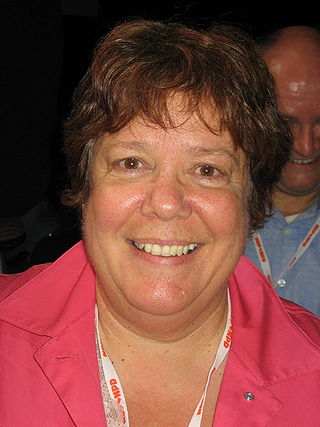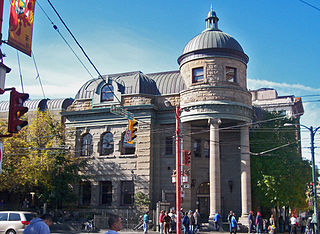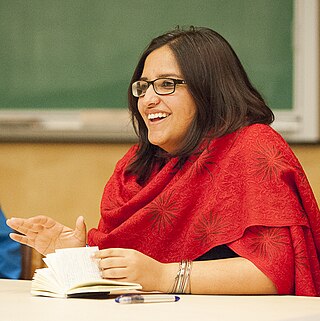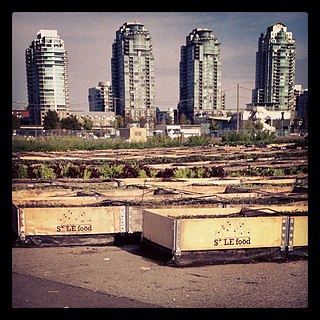
Libby Davies is a Canadian politician from British Columbia. She was the member of Parliament for Vancouver East from 1997 to 2015, House Leader for the New Democratic Party (NDP) from 2003 to 2011, and Deputy Leader of the party from 2007 until 2015. Prior to entering federal politics, Davies helped found the Downtown Eastside Residents Association and served as a Vancouver city councillor from 1982 to 1993.

Gastown is the original settlement that became the core of the city of Vancouver, British Columbia, Canada, and a national historic site and a neighbourhood in the northwest section of the Downtown Eastside, adjacent to Downtown Vancouver.

The Downtown Eastside (DTES) is a neighbourhood in Vancouver, British Columbia, Canada. One of the city's oldest neighbourhoods, the DTES is the site of a complex set of social issues, including disproportionately high levels of drug use, homelessness, poverty, crime, mental illness and sex work. It is also known for its strong community resilience, history of social activism, and artistic contributions.

The West End is a neighbourhood in Vancouver, British Columbia, Canada, located between the Coal Harbour neighbourhood and the financial and central business districts of Downtown Vancouver to the east, Stanley Park to the northwest, the English Bay to the west, and Kitsilano to the southwest across the False Creek opening.

Davie Village is a neighbourhood in the West End of Vancouver, British Columbia, Canada. It is the home of the city's LGBT subculture, and, as such, is often considered a gay village, or gaybourhood. Davie Village is centred on Davie Street and roughly includes the area between Burrard and Jervis streets. Davie Street—and, by extension, the Village—is named in honour of A.E.B. Davie, eighth Premier of British Columbia from 1887 to 1889; A.E.B's brother Theodore was also Premier, from 1892 to 1895.

The Woodward's Building is a historic building in the Downtown Eastside of Vancouver, British Columbia, Canada. The original portion of the building was constructed in 1903 for the Woodward's Department Store when that area of Cordova Street was the heart of Vancouver's retail shopping district. At one time, this was the premier shopping destination in Vancouver. The store was famous for its Christmas window displays, and its basement Food Floor and the "W" sign at the top of the building was distinctive landmark on the Vancouver skyline.

Strathcona is the oldest residential neighbourhood of Vancouver, British Columbia, Canada. Officially a part of the East Side, it is bordered by Downtown Vancouver's Chinatown neighbourhood and the False Creek inlet to the west, Downtown Eastside to the north, Grandview-Woodland to the east, and Mount Pleasant to the south of Emily Carr University and the Canadian National Railway and Great Northern Railway classification yards.

CFRO-FM is a non-commercial community radio station in Vancouver, British Columbia. It is a legally registered co-operative and is branded as Co-op Radio. It is owned by Vancouver Co-operative Radio, with studios and offices on Columbia Street off Hastings Street in Vancouver's Downtown Eastside. The station airs programmes in four categories: public affairs and news, music, multi-lingual and arts. The group producing each programme is mostly self-governing, within the co-operative frame. CFRO is a member of the National Campus and Community Radio Association.

Downtown Vancouver is the central business district and the city centre neighbourhood of Vancouver, Canada, on the northwestern shore of the Burrard Peninsula in the Lower Mainland region of British Columbia. It occupies most of the north shore of the False Creek inlet, which cuts into the Burrard Peninsula creating the Downtown Peninsula, where the West End neighbourhood and Stanley Park are also located.

Carnegie Community Centre is located at 401 Main Street at the corner of Hastings Street, in the old Carnegie Public Library building in the Downtown Eastside of Vancouver, British Columbia.

Bruce Eriksen was an artist, social activist and founder of Vancouver's Downtown Eastside Residents Association (DERA). Eriksen and DERA are recognised for materially improving the lives of residents in the Downtown Eastside (DTES).

The Missing Women Commission of Inquiry was a commission in British Columbia ordered by the Lieutenant Governor in Council on September 27, 2010, to evaluate the response of law enforcement to reports of missing and murdered women. The commission concluded its Inquiry in December 2012, and outlined 63 recommendations to the Provincial government and relevant law enforcement. The Inquiry itself received criticism from various civil society group and Indigenous communities, regarding its investigative structure, as well as, the lack of government action after the Inquiry to fulfill its recommendations.

The Vancouver Area Network of Drug Users or VANDU is a not-for-profit organization and advocacy group based in Vancouver, British Columbia, Canada. The group believes that all drug users should have their own rights and freedoms. The group's members have been actively involved in lobbying for support of Insite, North America's first safe injection site, located in the Downtown Eastside of Vancouver.
The gentrification of Vancouver, Canada, has been the subject of debate between those who wish to promote gentrification and those who do not.
Trisha Baptie is a Vancouver-based citizen journalist and activist for the abolition of prostitution.

Homelessness is a social crisis that has been rapidly accelerating in the Canadian city of Vancouver, British Columbia, over the last decade. According to the United Nations, homelessness can either be relative or absolute. Absolute homelessness describes people living in absence of proper physical shelter. Relative homelessness describes people living in poor conditions of health or security, including an absence of both personal safety and steady income despite having physical shelter to reside in. As of 2023, roughly 2,422 people in Vancouver are subject to one of these types of homelessness, or are transitioning between them.

Harsha Walia is a Canadian activist and writer based in Vancouver. She has been involved with No one is illegal, the February 14 Women's Memorial March Committee, the Downtown Eastside Women's Centre, and several Downtown Eastside housing justice coalitions. Walia has been active in immigration politics, Indigenous rights, feminist, anti-racist, anti-statist, and anti-capitalist movements for over a decade.

Sole Food Street Farms is an urban agriculture project in Vancouver, British Columbia, Canada. Founded in 2008 by Michael Ableman and Seann Dory, Sole Food's mission is to provide low-income residents of the Downtown Eastside with "jobs, agricultural training, and inclusion in a supportive community of farmers and food lovers." It is a subsidiary of Cultivate Canada, a local charity that promotes human ecology-related social projects. Sole Food is the largest urban farm attempted in Vancouver, and through it Ableman hopes to demonstrate that "urban agriculture can in fact be considered a serious enterprise for urban areas." He emphasizes that it is of a larger scale than community gardens and that it could be a "serious enterprise for urban areas." Since its inception, Sole Food has been met with significant community support. Grants from a variety of sources including the city of Vancouver, banks, as well as philanthropists enable Sole Food to continue expanding their operations. Sole Food's vision aligns closely with Vancouver’s Greenest City 2020 Action plan to increase production of locally grown food, hence the city has provided them with generous support. Being a non-profit social initiative, priority is placed upon improving the community: employees, many of whom are current or recovering drug addicts receive paid training, and 10% of the produce harvested is donated to neighbourhood agencies. Due to the small scale of Sole Food and the use of high-quality seeds, the food produced is relatively expensive compared to conventionally grown crops. As such, the food grown does not go toward feeding impoverished residents of the Downtown Eastside, but rather to a number of upscale restaurants that specialize in locally sourced ingredients. The produce is sold to 30 restaurants in Vancouver that specialize in using locally-sourced ingredients. It also sells to seven local farmers’ markets.
Portland Hotel Society (PHS) is a Canadian non-profit society created in 1993 to provide advocacy, housing, services, and opportunities, for Vancouver's Downtown Eastside. Its staff support thousands of supportive housing rooms and operate North America's first legal supervised-injection site, Insite, a Downtown Eastside credit union branch, a food service that feeds people in single-room occupancy residences, and other social services and enterprises.
Gillian Jerome is a Canadian poet, essayist, editor, university instructor and high-school educator. She won the City of Vancouver Book Award in 2009 and the ReLit Award for Poetry in 2010. Jerome is a co-founder of Canadian Women In Literary Arts (CWILA), and also serves as the poetry editor for Geist. She is a lecturer in literature at the University of British Columbia and also runs writing workshops at the Post 750 in downtown Vancouver.















